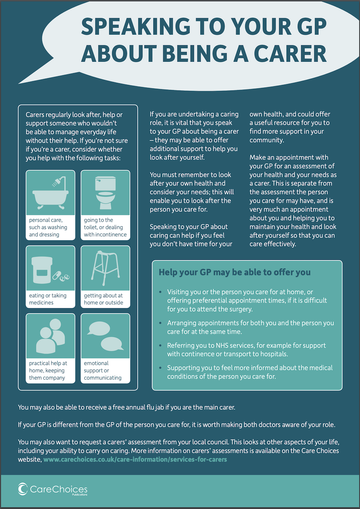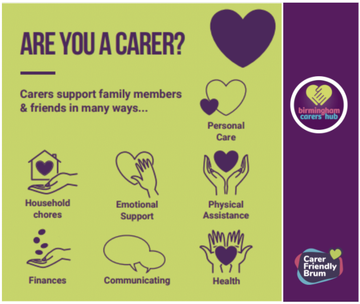Putting policy into practice: support to carers
KnowledgeNICE has recently updated their guidance for MS, and several key changes stand out, one of which is the new onus on involving family carers, or those in a caring role, from the point of diagnosis onwards.
This is a wonderful change to see, but it raises a number of questions if we are to put this policy into practice, from who we perceive as being in a caring role, to how we engage with them, what support we offer and whose responsibility it is to ensure they receive this support.
NHS Commissioning
In an informal conversation, our Head of Nursing Ruth Stross, health writer Charlie Peel and James Townsend, CEO of Mobilise, try to unpick what this policy change might look like in practice, identifying some of the challenges, discussing some of the system-wide changes that might be needed, and sharing some ideas that individual healthcare professionals can implement now.
| Make a change now: a few ideas |
|---|
| Being equipped and equipping others: |
| ●Have information and resources available to signpost people to as and when they are needed |
| ●Consider a flyer or prompt in your waiting area to get people asking themselves 'Am I in a caring role?' |
| At / around diagnosis: |
| ●Remember that MS can affect the whole family in different ways - and that this will change across the life experience of someone. |
| ●They may not be ready for lots of information but making sure that individuals know that there are lots of different support available - and that they can ask if they want any information now, or in the future. |
| During follow-ups and review appointments: |
| ●Add a brief question into your pre-clinic questionnaire: 'We know that MS impacts your whole family - do you think any of your loved ones would value support in their caring role?' |
| ●Consider a coaching approach : share conversational prompts to encourage discussion between the person with MS and their family or friend in a caring role. |
| Communicate: |
| ● Include comments about or from those in a caring role in notes shared with the wider MS team, hospital and community teams, GPs - and any other relevant professionals involved in that individual's care and support. |
| Include the whole team: |
| ● Keep in mind, across the whole healthcare team, that those in a caring role have an impact on the outcomes of the person with MS, as well as their roles' impact on their own health and wellbeing. |
Mobilise, July 2021, p6
Resources:
Signposting for people in a caring role:
- Mobilise website: and specific gateway page around support to carers
- An online course for those new to a caring role highlighting statutory support, creating a community, information and emergency planning
- MS Society 'Support for carers' gateway page to various resources, information and support
- MS young carer's group (MS Society)
- shift.MS social network for people affected by MS
- MS Trust online information for carers
Examples of communication to carers from around the country:
Flyer from Care Choices encouraging people who may have a caring role to speak with their GP about different support available

Flyer from Forward Carers Birmingham to encourage those in a caring role to identify this:

Further education on involving people in a caring role:
- 'I like it when…' simple ideas direct from people in a caring role, aimed at GPs, hospitals and others in their community
- Online course to support involving family carers from Parkinson's UK
- Interview with Prof Annette Hand - she discusses the importance of involving carers in work alongside people with Parkinson's within a wider interview
Signposting to assessments and relevant paperwork:
- Updated documentation for the Comprehensive Review Quality standard 6 for MS refers to the importance of a 'comprehensive review'. TiMS (Therapists in MS) have a 'self reported assessment tool' on their website which can be used for this.
- Adult carer': NICE guidance: Involving carers 2019
About carer support:
'The information and support needs of carers will vary and the evidence did not identify one particular way of supporting carers. However, it did show that carers have better outcomes, such as maintaining quality of life and reduced carer burden, when supported. The committee agreed that health and social care providers should go beyond the strict statutory requirement for carers' assessments to ensure that the needs of carers are considered (including respite and psychological support), and that the varied needs of different carer groups are taken into account.' NICE guidance: Involving carers 2019
For those of you who love to dive deep into the documents, All mentions of involving people in a caring role within the updated NICE Guidance 'Multiple sclerosis in adults: management' (NG220) are listed below:
At diagnosis:
1.2.10 Explain to carers (including young carers) about their right to a carer's assessment and tell them about other sources of information and support that may be available (see NICE's guideline on supporting adult carers and the Young Carers [Needs Assessment] Regulations 2015).
Information and support for people planning to have children or who are pregnant
Explain to people with MS, and their partners if appropriate, that MS should not stop them from planning a family. Offer the opportunity to talk with a healthcare professional with knowledge of MS to answer any questions they have. For example, this may include discussing the following:
That support that may be available with caring for and supporting children. [2022]
Information and support for people as MS becomes more advanced, including those approaching the end of their life
1.2.15 Give people with MS that is becoming more advanced and their family members or carers information and support covering:
• social isolation and feelings of depression
• other support available, such as legal rights including social care, employment rights and benefits, and the right to a carer's assessment
1.2.16 Explain to people with advanced MS and their family members or carers about the services available (for example, occupational therapy, palliative care and social services) and give them support to access them if needed.
1.2.18 When appropriate, explain to the person with MS (and their family members or carers if the person wishes) about advance care planning and power of attorney. Think about discussing advance care planning early if you expect the person's ability to communicate, cognitive status or mental capacity will deteriorate. Follow the recommendations on advance care planning in NICE's guideline on decision making and mental capacity.
Spasticity
1.5.25 Assess people with MS and suspected spasticity for factors that might worsen spasticity, for example, pressure ulcers, bladder and bowel dysfunction and infections, poor posture or positioning, and pain. Provide support and information to help people with MS, and their families and carers if appropriate, to prevent and manage these factors.
Comprehensive Review
1.6.9 Discuss the care provided by carers and care workers as part of the person's care plan. Ensure that carers (including young carers) know about their right to a carer's assessment
Related articles
Encouraging excellence, developing leaders, inspiring change
MS Academy was established in 2016 and in that time has accomplished a huge amount with exciting feedback demonstrating delegates feel inspired and energised along their personal and service development journeys. The various different levels of specialist MS training we offer are dedicated to case-based learning and practical application of cutting edge research.


